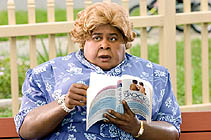|
|
|
|
Big
Momma's House
|
 |
|
A world away from the inspired cheekiness of Scary Movie (2000), Big Momma's House is a comedy that aims to offend no one. It sets up a theme of potential racial difference – black cop Malcolm (Martin Lawrence) and his white partner Paul (Paul Giamatti) move into a homely, all-black, Southern neighbourhood on a case – but ignores this possibility. It raises various titillating subjects – including the sex life of elderly citizens like the gregarious Big Momma (Ella Mitchell) – but prefers, in the end, to preach solid values of family and community. All matters of race or sex are finally peripheral to the film's main attraction – Malcolm dressed up in a huge latex costume as Big Momma, worming his way into the affections of Sherry (Nia Long), a single mother on the run from her sinister criminal boyfriend, Lester (Terrence Howard). As Malcolm struggles with duct tape, wigs and Southern cooking, he also moves inexorably towards the moment when he must confess his deception to Sherry. Big Momma's House is fast and often hilarious. Even the most obvious gags – like Malcolm, in disguise, showing off in martial arts class or on a basketball court – work as they should. The film wisely plays on its own unbelievability (characters are always looking at this faux Momma askance), but Lawrence's vocal and bodily mannerisms are consistently fresh and amusing. Director Raja Gosnell may not be acclaimed as an auteur any time soon, but his crafty dexterity with contemporary light comedy is truly admirable. In Home Alone III (1997) he guided the combination of laughs and a modest action plot. In the more impressive Never Been Kissed (1999), he handled the difficult premise of masquerade, keeping pace with all the required plot twists and shifts in viewpoint. Big Momma's House uses all these diverse ingredients. It is a typical example of contemporary Hollywood entertainment, aiming to include many genres and audiences. Gosnell has the knack of signalling, deftly and gracefully, when the movie is about to make one of its many high-wire transitions from stakeout thrills to broad, burlesque humour, or to a sentimental, romantic intrigue. (Perhaps he learnt something about wrangling odd, multi-shaped materials when he did service as additional editor on Altman's Popeye [1980].) None of this would hold together, however, if the star at its centre was not able, also, to signal and carry such changes in tone. Big Momma's House has opened my eyes to the magic of Martin Lawrence. Several of his projects (especially A Thin Line Between Love and Hate [1996] which he also directed) have tried to project him both as a serious actor and a wild comedian in the Eddie Murphy tradition. Here, he manages to convey a quiet charm that bridges shootouts and dance scenes, sporty exhibitions and religious monologues. MORE Gosnell: Scooby-Doo © Adrian Martin September 2000 |
![]()